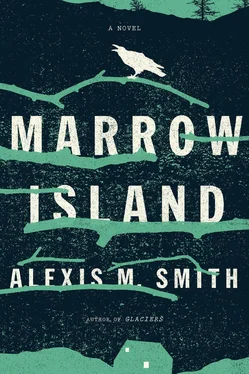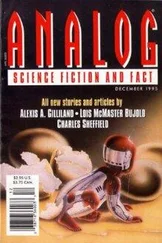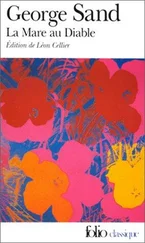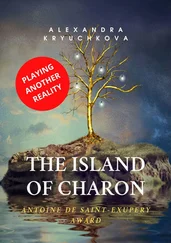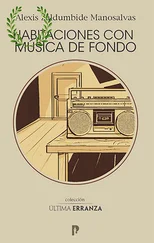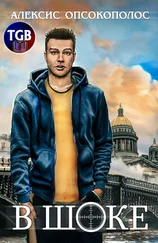The second beer goes down while I’m up to my ankles, kicking one foot then the other to acclimate them. The sun is directly overhead now, shining hard on me, shining straight into the water. I look out across the whole of the lake as a breeze stirs it up and the smallest whitecaps I’ve ever seen wave at me from the deep, dark center. I drink the rest of the beer, feeling the blood thump in my feet.
I look out several feet in front of me and catch a strange glimmer in the water, threads of light, dancing like weeds from the lake floor, at first just one, then I count three, four, six. I blink, let my pupils adjust. Still there, a trick of the light. Burning on the back of my eye. Like the filaments of incandescent light bulbs. Like old-fashioned tinsel from a Christmas tree. I look away, but when I look back, they are still there. When I move my foot, they move with the ripples but stay more or less in the same place. They are farther out than I planned to go, but I want to get closer to them.
I back out of the water, watching them, letting the angle of light through the trees change my view, but I still see them there. I try not to take my eyes off them as I drop the beer can, take off my jeans and unbutton my plaid shirt. I pull my tank over my head as quickly as I can, and they are still there, glowing elements, shocks of lightning, though they seem slightly farther out than before. I consider leaving my bra and underwear on, but it seems weirder, somehow, to wear them, so I take them off, too, and drop them on the pile of clothes.
Naked on the shore, I watch the filaments underwater. The lake surface quakes in a breeze. It beckons me, with its crisp little waves, so I walk into the lake. When the water reaches my navel, I take a breath and dive under. My eyes close on their own, and when I force them open, they burn and everything blurs. Then ribbons of light streak through the water, and for a moment I think I can see the filaments again, but then they are gone.
I surface panting, water dripping over my face, off my eyelashes, scanning for the filaments, eyes skimming the water all around me, raking my arms to stay afloat. I swim back toward the shore, and that’s when I notice the larvae, skirting the warmer, weedy, silted edges of the lake: thousands of them, translucent, writhing, their mosquito mothers hovering over them. I think it’s another trick of the light, but I can almost feel their hunger; I am sure they can smell me. I find the rocky floor and stand hip deep, swaying. When the air hits me, I feel the tug of cold water on my numb limbs and scramble ashore.

ORWELL ISLAND, WASHINGTON
OCTOBER 10, 2014
I CALLED THE sheriff from the cottage. My voice shook a little as I explained to the dispatcher that I thought my neighbor was missing. She told me to file a report at the station in the morning.
“I can do that, but there are signs of — a struggle, I guess, at his house.”
“What do you mean, ma’am?”
“Overturned lamps, a half-packed suitcase with medication left in it. His eyeglasses. I haven’t seen him all day.”
“Do you see him every day, ma’am?” She sounded young but jaded — a world-weary eighteen-year-old.
“No—” I decide not to tell her that I’ve never met the man. “But this seems unusual, for him.”
“Do you have any reason to believe he’s in danger?”
“Not really, no. But I’m alone on this side of the island, and he’s my only neighbor. I won’t be able to sleep.”
She sighed.
I hated how frightened I sounded. She was right; it could wait till morning. It was an unnerving scene, but so were lots of odd scenes in strangers’ homes — I had no context. Maybe an emergency called him away from his packing? Did I really want to explain to a sheriff’s deputy why, in the middle of the night, I had snuck into the house of a man I’d never met? I could hear her typing.
“All right, ma’am. Looks like there’s a deputy who can come out.” She took down my name and address.
I had toast and coffee and listened to the radio while I waited. After a while, I heard the wheels of a car coming down the lane and pulling in the drive behind my car. Chris Lelehalt stepped out.
“Shit,” I said. I took a breath and met him at the door.
He nodded at me. “Hi there, ma’am.” He pulled a notebook from his pocket and read, then looked up again. “Lucie Bowen?”
“That’s me.” He didn’t seem to remember me. He nodded again and looked over his notes, then half turned and looked over his shoulder toward Rookwood. He was a handsome guy — clean-shaven, so you could see his features — broad-nosed, dark-eyed, high cheekbones. He looked like he drank plenty of beer and probably had been doing so since he was fourteen, like a lot of the kids on the islands, but he still looked like the boy I had known, too. He looked back at me.
“You’ve gotten older,” he said.
“You, too.”
He shrugged.
“Actually, I wouldn’t have recognized you, but Marla Sharpe told me you were back to check on the place.” He indicated the cottage.
“Ah.” I nodded. “She’s the lady with the low-down on Orwell, I guess.”
He smiled. “She means well. The old-timers, you know. They keep track.”
I let him inside and offered him coffee, but he declined. It was almost ten o’clock. He was working a split shift; another deputy was on maternity leave. So I walked him across the road to Rookwood. On the way he asked me questions about when I arrived on the island, how long I was staying, how my mom was doing. I couldn’t tell if this was an official interrogation or just small talk.
When we reached the door, he raised his hand to knock, then stopped himself and asked, “Why did you go in, again?”
I explained about the light, about not seeing any sign of Jacob Swenson all day. I played up the family connection: my grandparents had been caretakers of Rookwood; I had run in and out freely as a child. He seemed satisfied with this answer and knocked hard, opened the door, calling inside.
“Mr. Swenson, it’s the Sheriff’s Department.”
The second visit went more or less as the first visit had gone, except that we turned on the lights. I led Chris on the route I had taken up the staircase, along the hall, and to the bedroom where the lamps were still lit. Chris looked over everything in the room, then he asked me to stand in the front entry while he looked over the rest of the house. It was a large house and I stood there for twenty minutes, listening to his footsteps, doors opening and closing. He had stopped calling out Jacob’s name.
When he came back through the entry, turning off lights behind him, he said, “He’s not here.”
We walked back to my cottage.
“Does it look suspicious to you?” I asked.
“I can’t say,” he said. “But I’ll make some calls tomorrow and try to track him down. We’ll come back over if we need to.”
I wasn’t satisfied, but I knew I wouldn’t get a better answer. Even small-town police were tight-lipped about investigations.
I spent the next day at the coffee shop on Anchorage Street with my laptop, looking for information on Jacob Swenson. I found out more about the Swenson Trust, Maura’s foundation. She had donated land all over the San Juan Islands to the state and county for parks, for wildlife conservation. The foundation still held private acreage on several islands, including Marrow and Orwell, which could be accessed for study with a letter of interest. The address listed was a PO box in Orwell Village. There was a picture of Jacob Swenson on the foundation’s website, a polished and combed man in a tweed suit, younger than I had imagined, in stylish tortoiseshell glasses. He looked like the template for a male humanities professor. But as for personal information, I found little. Two articles in the Island Times mentioned him in relation to cultural events on Orwell. He had been on the town council for a time and was referred to as “the dapper councilman” and an “inveterate bachelor.” (Code for gay in the passive-aggressively discreet vernacular of small towns.)
Читать дальше
